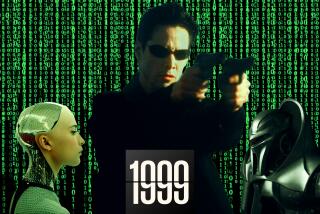Ghost in the Machine
What really scares us about science and technology isn’t that they will be perverted by mad researchers or abused by dictators. It’s that their progress is unstoppable, irreversible. Whatever people can do, they will do--even, as in the movie “The Matrix,” inventing the machines that will enslave us.
John Darnton taps into that fear in his latest “science adventure” thriller, “Mind Catcher.” In one of its subplots, young computer experts accept such a future as a given and try to put a positive, evolutionary spin on it. “Computers will exceed human intelligence by 2020.... Man and machine will link up and evolve together. This is inevitable once machines replicate themselves. And so the only answer for humankind is to figure out a way to enter into that system of evolution. If we don’t, we’ll be left behind.”
Far simpler, it would seem, to strangle the new machines in their silicon cradles, but nobody is going to do that. Yet passivity and despair aren’t what thrillers are about. Darnton, a veteran New York Times reporter whose previous novels are “Neanderthal” and “The Experiment,” eventually lets us off the hook in the interests of drama. He focuses on the lesser danger: an individual, evil doctor, named, appropriately, Warren Cleaver.
Cleaver is in charge of a rundown mental hospital on one of New York City’s islands, a refuse bin for patients nobody cares about any longer. Thus he’s free to experiment on them. His interest is in the moment of death.
Loved ones far away sometimes report visitations from the dying person. Does the mind, then, escape the confines of the brain? Can this free-floating spirit--known traditionally as the soul--be tracked, captured, hooked up to a computer? Can it be controlled? In the dedication to this novel, Darnton notes that his father was killed in New Guinea during World War II and that his mother “said she knew of his death the moment it occurred.” Characters in “Mind Catcher” have similar experiences. Tyler Jessup, a 13-year-old boy whose injury in a rock-climbing accident gives Cleaver the chance to try out his theories, “saw” his mother when she died in a plane crash. Dr. Kate Willet, who helps renowned neurosurgeon Dr. Leopoldo Saramaggio operate on Tyler, heard her mother describe “seeing” her father when he was killed in Vietnam.
Tyler is rushed to New York with a climbing tool sunk deep in his brain. Saramaggio views the operation as his ticket to lasting fame, just as pioneering heart transplants were for Dr. Christiaan Barnard. He plans to repair the damage to Tyler’s brain by extracting stem cells, growing them in a laboratory and reinserting them. Meanwhile, in case the boy falters, the involuntary functions of his brain will be kept going by Cleaver’s computers.
Saramaggio is an egotist and a showboater, but not truly bad. Cleaver is another matter, willing to sacrifice anyone in the supposed interests of science (Willet takes a first look at him and thinks of Lenin). His own, secret plan for the computers is to suck out the contents of Tyler’s mind, whether the boy survives physically or not.
Fighting for Tyler’s life, and later for his death with dignity, is his father, Scott, a photographer. His struggle is joined by Willet, who is dismayed by the godlike pretensions of her colleagues. The two fall in love and are just coming to terms with grief--Tyler, they are sure, is dead and buried--when Scott’s computer screen lights up with messages about things that only he and his son, exceptionally close, could know.
Unfortunately, this is when the novel runs thin--at the point where reportage must give way to imagination. Darnton is a Pulitzer Prize-winning journalist; as we would expect, “Mind Catcher” is exhaustively researched. Brain surgery, stem cells, acute mental illnesses, cyber culture, Tyler’s climb, Scott’s photography--all are described in detail. But the people are fairly stock thriller characters, and the journey into the unknown--wherever Tyler’s mind has gone--could be imagined more vividly and interestingly by any Hollywood special-effects shop, and no doubt will.
More to Read
Sign up for our Book Club newsletter
Get the latest news, events and more from the Los Angeles Times Book Club, and help us get L.A. reading and talking.
You may occasionally receive promotional content from the Los Angeles Times.








